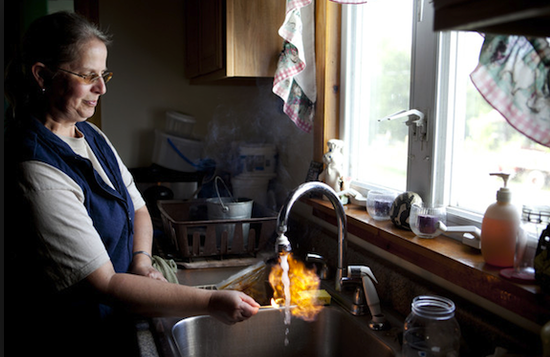
Another win for big oil and the fracking industry?
According to a new report from the EPA, fracking, which is the controversial process of drilling through the Earth into shale through clean drinking aquifers and shoving poisonous chemicals into the hole to extract oil (in lay man’s terms), has no “widespread” affect on the populations drinking water. The definition of “widespread”, according to Dictionary.com is:

BYPASS THE CENSORS
Sign up to get unfiltered news delivered straight to your inbox.
You can unsubscribe any time. By subscribing you agree to our Terms of Use
Latest Video
Widespread: “distributed over a wide region, or occurring in many places or among many persons or individuals:”
Antonyms for the word “widespread” via Thesaurus.com include: “concentrated”, “local”, “narrow”, and “limited” – so what exactly is the EPA saying when they state that fracking doesn’t cause widespread damage to water? By pure scientific word process of elimination, if fracking doesn’t have widespread impacts on drinking water, then it would have the opposite of widespread.
Is the EPA saying then saying that fracking has concentrated and local impacts on drinking water? It would seem so.
According to a report in The Wall Street Journal:
Fracking isn’t causing widespread damage to the nation’s drinking water, the Obama administration said in a long-awaited report released Thursday.
The U.S. Environmental Protection Agency—after a four-year study that is the U.S. government’s most comprehensive examination of the issue to date—concluded that hydraulic fracturing, as being carried out by industry and regulated by states, isn’t having “widespread, systemic impacts on drinking water.”
However, the EPA said there were a small number of contaminated drinking wells and highlighted potential vulnerabilities, including the disposal of wastewater and construction of durable wells.
Fox News said regarding the report:
The [EPA] did say the controversial drilling technique could affect drinking water if safeguards aren’t maintained. It found specific instances where poorly constructed drilling wells and improper wastewater management affected drinking water resources.
But the EPA also reported the number of cases was small compared with the large number of wells that use hydraulic fracturing, better known as fracking.
For industry and congressional voices who have long argued the health hazards associated with fracking are overblown, the report appeared to be a boon.
“Today’s study confirms what we already know. Hydraulic fracturing, when done to industry standards, does not impact drinking water,” Sen. Lisa Murkowski, R-Alaska, chairwoman of the Senate Energy and Natural Resources Committee, said in a statement. “States have been effectively regulating hydraulic fracturing for more than 40 years and this study is evidence of that.”
Fracking has been embroiled in controversy since the practice became more widespread in past years. Aside from awful stories of contaminated drinking water, people in fracking communities being made sick, and other physical diseases – it has some major implications on the stability of our Earth – literally. The State of Oklahoma recently released statements and studies confirming that fracking causes earthquakes.
Eco Watch reported:
[T]he state has not only admitted that the injection into deep underground wells of fluid byproducts from drilling operations is behind the quakes, but it put up a website titled Earthquakes in Oklahoma that is a “one-stop source for information on earthquakes in Oklahoma.” The site includes an interactive map that displays the dramatic change not only in the number of earthquakes but in their distribution. Instead of a scattering around the state, they’re clustered heavily in areas where drilling operations are disposing of fracking wastewater.
The new website says, in a post dated April 21, “The Oklahoma Geological Survey announced today the majority of recent earthquakes in central and north-central Oklahoma are likely triggered by the injection of produced water in disposal wells.”
We want to hear from you what you think of the EPA’s most recent study. Sound off below!


